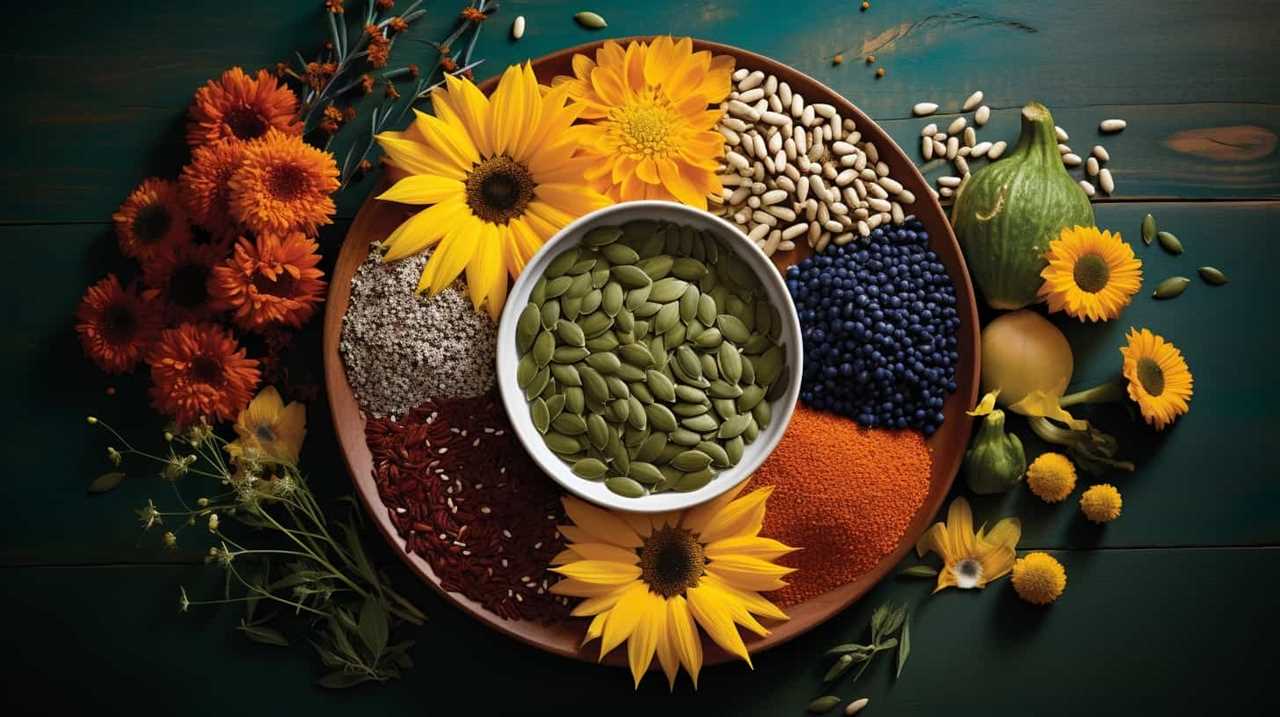Hello everyone!
We’ve got some eye-opening news for you about chia seeds. You know, those tiny powerhouses that have become quite the trend lately?
Well, it turns out there are some hidden perils lurking within. In this article, we’ll reveal the health risks associated with chia seeds that you might not be aware of.
From potential allergies to gastrointestinal discomfort and even interactions with medications, we’ve got you covered.
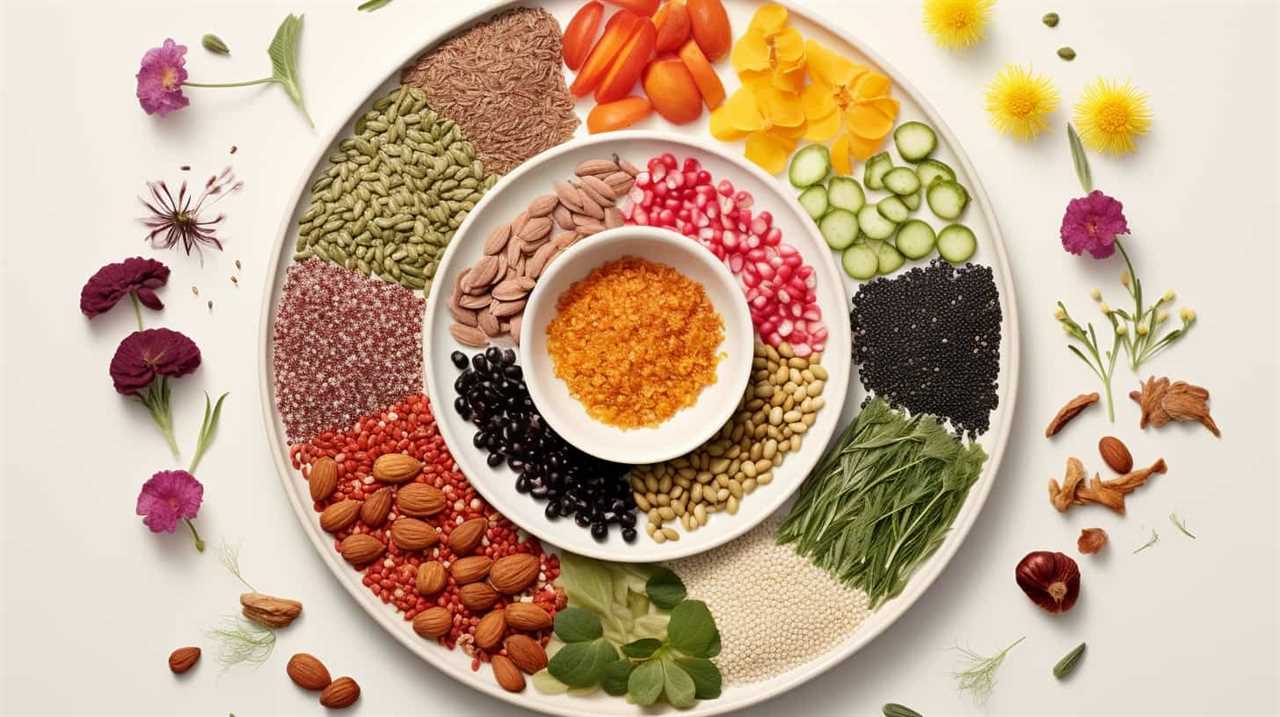
So, grab a cuppa and let’s dive into the fascinating world of chia seeds!
Key Takeaways
- Chia seeds can trigger cross-reactivity allergies in some individuals, especially those allergic to mustard or sesame seeds.
- Severe allergic reactions to chia seeds can lead to anaphylactic shock, a life-threatening condition, so individuals with known allergies should exercise caution when consuming them.
- Some individuals may experience digestive discomfort, such as bloating or gas, after consuming chia seeds due to their high fiber content. Starting with small amounts and gradually increasing intake can help minimize side effects.
- Chia seeds can interact with certain medications, such as blood thinners and diabetes medications, so it’s important to consult a healthcare provider before incorporating them into your diet if you are taking any medications.
Potential Allergic Reactions
Potential allergic reactions to chia seeds can pose health risks for individuals consuming them. It’s important to note that chia seeds, while considered a healthy superfood, can also trigger cross reactivity allergies in some people. Cross reactivity allergies occur when the body reacts to similar proteins found in different foods.
For example, individuals with a known allergy to mustard or sesame seeds may also be at risk of developing an allergic reaction to chia seeds due to the similarities in their protein composition. In severe cases, these allergic reactions can lead to anaphylactic shock, a life-threatening condition that requires immediate medical attention.
It’s crucial for individuals with known allergies to be aware of this potential risk and to exercise caution when consuming chia seeds or products containing them.
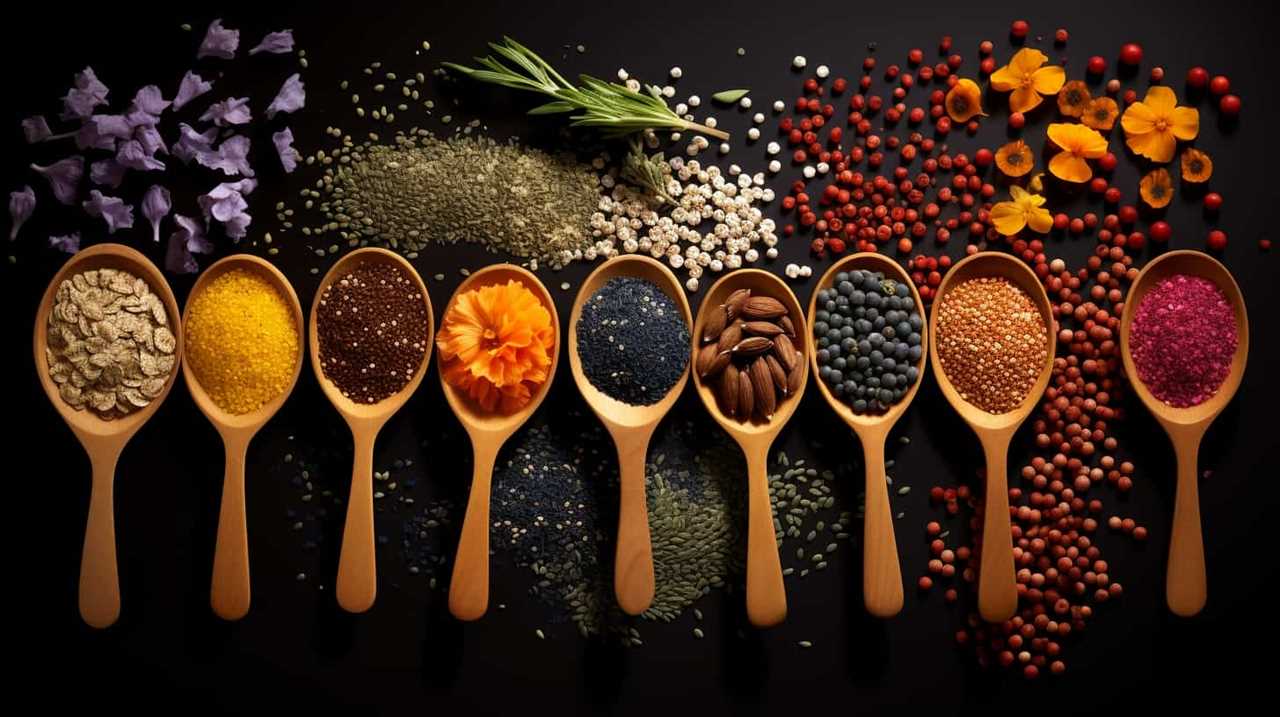
Transitioning into the subsequent section about gastrointestinal discomfort, it’s also important to discuss the possible digestive issues that can arise from consuming chia seeds.
Gastrointestinal Discomfort
Moving on from potential allergic reactions, another issue that can arise from consuming chia seeds is gastrointestinal discomfort. While chia seeds are generally well-tolerated by most people, some individuals may experience digestive issues or stomach problems after consuming them. This can include symptoms such as bloating, gas, diarrhea, or stomach cramps. These discomforts may be attributed to the high fiber content of chia seeds, which can be challenging for some individuals to digest.
It’s important to note that these symptoms are usually mild and temporary, and they can often be alleviated by drinking plenty of water and consuming chia seeds in moderation. However, if the gastrointestinal discomfort persists or becomes severe, it’s advisable to consult a healthcare professional.
Now, let’s move on to discuss the potential interactions of chia seeds with medications.
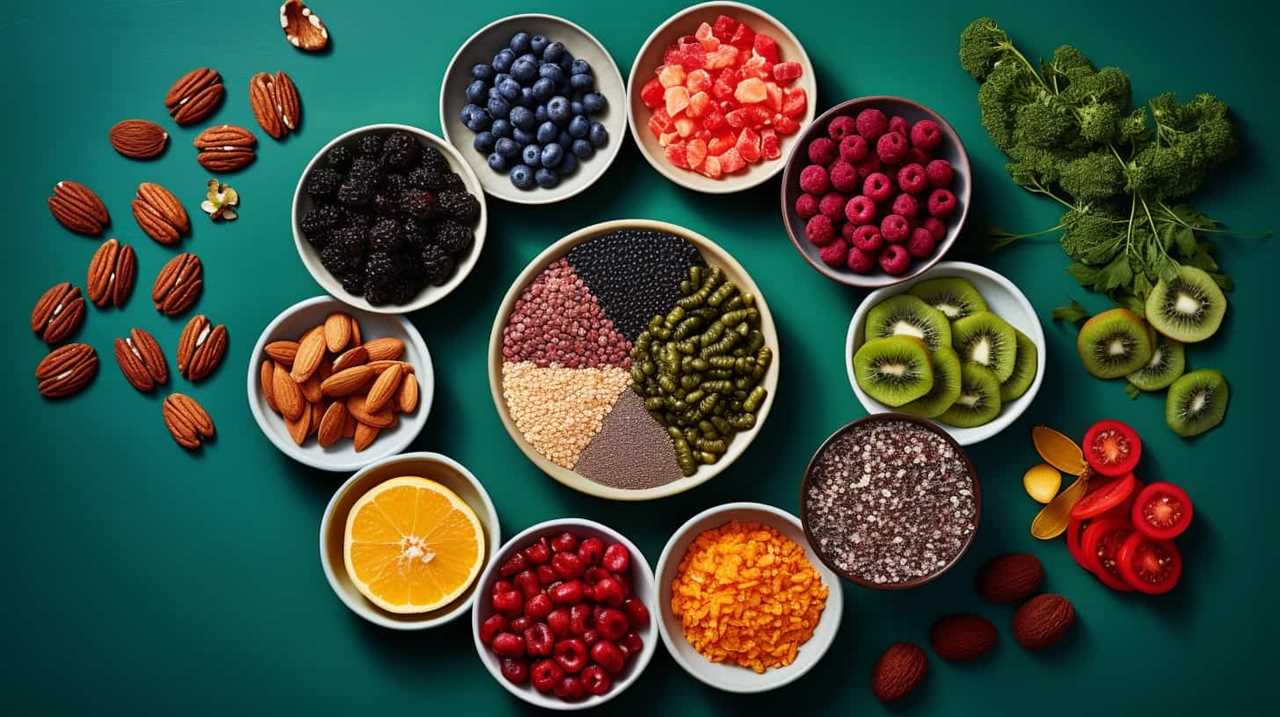
Interactions With Medications
Chia seeds have potential interactions with medications that individuals should be aware of. It is important to understand the possible risks and complications that can arise from combining chia seeds with certain medications. To help you navigate this potential minefield, we have created a table outlining some of the known interactions between chia seeds and commonly used medications.
| Medication Category | Medication Name | Potential Interaction |
|---|---|---|
| Blood Thinners | Warfarin | Chia seeds may enhance the effects of blood thinners, increasing the risk of bleeding. |
| Diabetes Medications | Metformin | Chia seeds may lower blood sugar levels, potentially leading to hypoglycemia when combined with diabetes medications. |
| Blood Pressure Medications | Lisinopril | Chia seeds may lower blood pressure, which can be problematic when taken with blood pressure medications. |
It is essential to consult with your healthcare provider before incorporating chia seeds into your diet, especially if you are taking any medications. Your healthcare provider can evaluate the potential risks and make recommendations to ensure your safety and wellbeing.
Blood Pressure and Heart Health Concerns
Continuing from our previous discussion on interactions with medications, let’s now delve into the concerns surrounding blood pressure and heart health when incorporating chia seeds into our diet.
When it comes to blood pressure management and cardiovascular health, it’s important to be aware of the potential risks associated with chia seeds. While chia seeds are generally considered safe for most individuals, there are a few things to keep in mind:
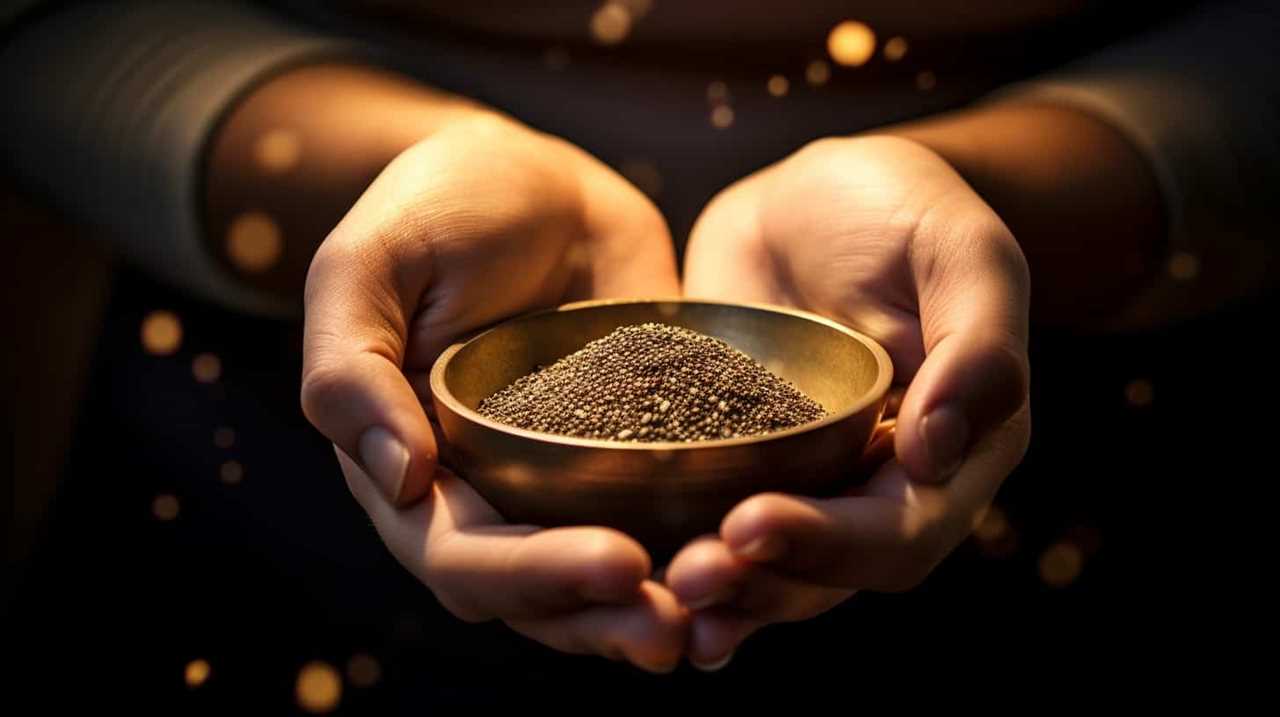
-
Blood pressure medication interactions: Chia seeds have the potential to interact with certain blood pressure medications, leading to potentially dangerous side effects. It’s crucial to consult with a healthcare professional before adding chia seeds to your diet if you’re taking medication for blood pressure management.
-
Omega-3 fatty acids and heart health: Chia seeds are a rich source of omega-3 fatty acids, which have been linked to improved cardiovascular health. However, it’s essential to consume them in moderation as excessive omega-3 intake may have adverse effects on heart health.
-
High fiber content: Chia seeds are packed with fiber, which is beneficial for heart health. However, consuming too much fiber without adequate hydration can lead to digestive issues and potentially affect blood pressure.
To ensure your overall well-being, it’s crucial to strike a balance and consult with a healthcare professional before making any significant dietary changes.

Choking Hazard for Certain Individuals
As we delve further into the potential risks of incorporating chia seeds into our diet, it’s important to address the choking hazard they can pose for certain individuals. While chia seeds are generally safe to consume, their ability to absorb liquids and expand can lead to a choking risk, especially for those who have difficulty swallowing or have a history of choking.
To prevent choking incidents, proper preparation is essential. It’s crucial to soak chia seeds in water or other liquids before consuming them. This allows the seeds to expand and become gel-like, reducing the risk of choking. Additionally, it’s important to chew chia seeds thoroughly before swallowing to ensure proper digestion.
Frequently Asked Questions
Can Chia Seeds Cause Anaphylaxis or Severe Allergic Reactions in Individuals With Allergies to Other Seeds or Nuts?
Yes, chia seeds can cause anaphylaxis or severe allergic reactions in individuals with allergies to other seeds or nuts. Cross reactivity risks exist, along with chia seed induced GI discomfort and potential medication interactions. Choking risks and precautions should be considered, as well as blood pressure effects and effects on heart conditions. Certain age groups may be at higher risk.
What Are Some Common Gastrointestinal Discomfort Symptoms That May Be Experienced After Consuming Chia Seeds?
When we consume chia seeds, we may experience common gastrointestinal discomfort symptoms like bloating and diarrhea. It’s essential to be aware of these potential reactions and listen to our bodies for a healthy and balanced experience.
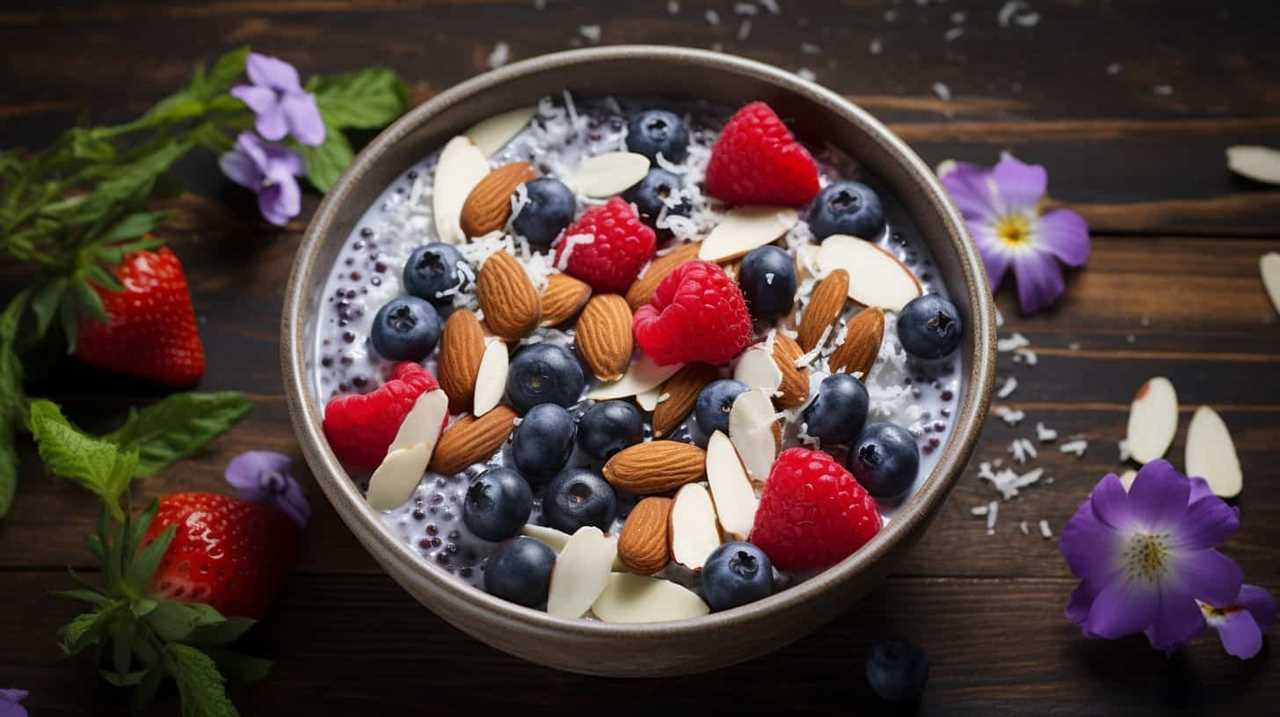
Are There Any Specific Medications That Should Be Avoided While Consuming Chia Seeds Due to Potential Interactions?
Potential drug interactions with chia seeds include hormonal medications. It is important to be cautious when combining these two, as chia seeds may affect the absorption or efficacy of certain medications.
Can Chia Seeds Negatively Affect Blood Pressure Levels or Pose Risks to Individuals With Pre-Existing Heart Conditions?
Chia seeds can potentially affect blood pressure levels and pose risks to individuals with pre-existing heart conditions. For example, they may interact with certain medications or have an impact on cholesterol and blood sugar levels.
Are There Any Age Groups or Individuals Who Are at a Higher Risk of Choking on Chia Seeds, and What Precautions Should Be Taken?
For higher risk age groups, such as children and the elderly, precautions should be taken to prevent choking on chia seeds. These include soaking them before consumption and ensuring they are consumed with plenty of liquid.
Conclusion
In conclusion, while chia seeds have gained popularity for their numerous health benefits, it’s important to be aware of the potential risks they may pose.

Allergic reactions, gastrointestinal discomfort, interactions with medications, and concerns regarding blood pressure and heart health should be taken into consideration.
Additionally, certain individuals may face a choking hazard when consuming chia seeds.
It’s crucial to consult with a healthcare professional before incorporating chia seeds into your diet to ensure they’re safe for you.

